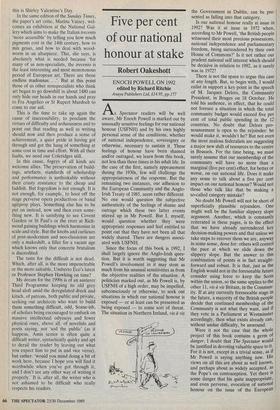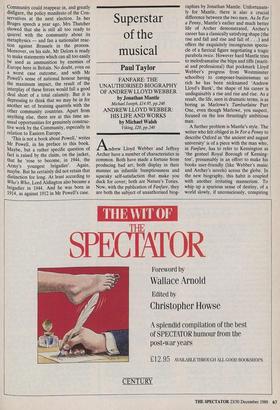Five per cent of our national honour at stake
Robert Oakeshott
ENOCH POWELL ON 1992 edited by Richard Ritchie
Anaya Publishers Ltd, £14.95, pp.177
As Spectator readers will be well aware, Mr Enoch Powell is marked out by unusually sensitive feelings for our national honour (USFNH) and by his own highly personal sense of the conditions, whether of national independence, sovereignty or otherwise, necessary to sustain it. These feelings of honour have been shamed and/or outraged, we learn from this book, not less than three times in his adult life. In the case of the first, namely appeasement during the 1930s, few will challenge the appropriateness of the response. But the remaining two instances, our adhesion to the European Community and the Anglo- Irish Treaty of 1985, seem rather different. No one would question the subjective authenticity of the feelings of shame and outrage which these two latter events stirred up in Mr Powell. But I, myself, would question whether they were appropriate responses and feel entitled to point out that they have not been all that widely shared. There are dangers associ- ated with USFNH.
Since the focus of this book is 1992, I shall largely ignore the Anglo-Irish ques- tion. But it is worth suggesting that Mr Powell's involvement in it may stem as much from his unusual sensitivities as from the objective realities of the situation. A politician marked out, as Mr Powell is, by USFNH of a high order, may be impelled, subconsciously or otherwise, to seek out situations in which our national honour is exposed — or at least can be presented as being exposed — to some sort of threat. The situation in Northern Ireland, vis a vis the Government in Dublin, can be pre- sented as falling into that. category.
Is our national honour really at issue in 1992? Was it at issue in 1972 when, according to Mr Powell, 'the British people witnessed their most precious possessions, national independence and parliamentary freedom, being surrendered by their own House of Commons?' Is it not rather our prudent national self interest which should be decisive in relation to 1992, as it surely was in 1972?
There is not the space to argue this case at any length. But, to begin with, I would enlist in support a key point in the speech of M. Jacques Delors, the Community President, in Bruges on 18 October. He told his audience, in effect, that he could not foresee a situation in which the total community budget would exceed five per cent of total public spending in the 12 countries. No doubt that Delors pro- nouncement is open to the rejoinder: he would make it, wouldn't he? But not even the most zealous federalists are suggesting a major new shift of resources to the centre in Brussels. For the time being, we must surely assume that our membership of the community will have no more than a marginal (five per cent) effect, for better or worse, on our national life. Does it make any sense to talk about a five per cent impact on our national honour? Would not those who talk like that be making a so-called category mistake?
No doubt Mr Powell will not be short of superficially plausible rejoinders. One might well be the familiar slippery slope argument. Another, which is constantly reiterated in these pages, is to the effect that we have already surrendered key decision-making powers and that unless we take steps to recover them we are, anyway in some sense, done for: others will control the pace at which we slide down the slippery slope. But the answer to this combination of points is in fact straight- forward and robust. It is that, just as the English would not in the foreseeable future consider using force to keep the Scots within the union, so the same applies to the other 11, vis a vis Britain, in the Commun- ity. If at any currently foreseeable stage in, the future, a majority of the British people decide that continued membership of the Community is not what they want, and if they vote in a Parliament at Westminster accordingly, then what exists already can, without undue difficulty, be unwound. Were it not the case that the whole project of this book contains a germ of danger, I doubt that The Spectator would be justified in devoting valuable space to it. For it is not, except in a trivial sense, as if Mr Powell is saying anything new. His views on all this are about as well known, and perhaps about as widely accepted, as the Pope's on contraception. Yet there is some danger that his quite inappropriate, and even perverse, evocation of national honour on the issue of the European Community could reappear in, and greatly disfigure, the policy manifesto of the Con- servatives at the next election. In her Bruges speech a year ago, Mrs Thatcher showed that she is still all too ready to quarrel with the community about its metaphysics — and fan a nationalist reac- tion against Brussels in the process. Moreover, on his side, Mr Delors is ready to make statements which can all too easily be used as ammunition by enemies of Europe here in Britain. No doubt, even on a worst case outcome, and with Mr Powell's sense of national honour having the maximum impact, the result of the interplay of these forces would fall a good deal short of a total calamity. But it is depressing to think that we may be in for another set of bruising quarrels with the other community countries. Apart from anything else, there are at this time un- usual opportunities for genuinely construc- tive work by the Community, especially in relation to Eastern Europe. `This is not a book about Powell,' writes Mr Powell, in his preface to this book. Maybe, but a rather specific question of fact is. raised by the claim, on the jacket, that he 'rose to become, in 1944, the Army's youngest brigadier'. Again, maybe. But he certainly did not retain that distinction for long. At least according to Who's Who, Lord Aldington also became a brigadier in 1944. And he was born in 1914, as against 1912 in Mr Powell's case.











































































































 Previous page
Previous page